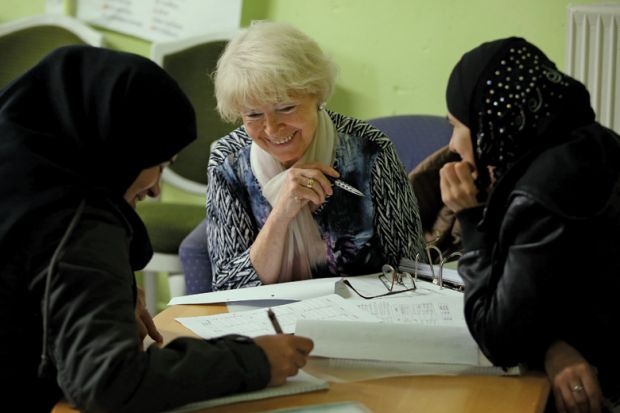Amid the sudden rise in the number of refugees coming to Europe last autumn, the University of Oslo’s rector, Ole Petter Ottersen, made a call for a national “academic dugnad” – a collective effort to alleviate the consequences of the refugee situation and to help refugees with an academic background enter academia.
Ottersen said: “We believe it is important that the refugees are received as whole people and given a chance to realise themselves. This may give refugees hope for a better future, and will ensure better integration in our society.”
His call received support from the entire Norwegian higher education sector.
Our own faculties here at the University of Oslo established an open lecture series called “På Flukt” (“Displaced”), in which our experts shared their knowledge on different aspects of the refugee situation.
By May 2016, more than 30 lectures had been arranged on a variety of subjects. When the government set up an expert committee to examine the long-term consequences of high immigration on society and to look at efficient integration measures for immigrants and refugees, one of our professors of sociology, Grete Brochmann, was appointed its chair.
In cooperation with the Oslo and Akershus University College of Applied Sciences, the Norwegian Universities and Colleges Admission Service and also the Norwegian Agency for Quality Assurance in Education, we explored the possibilities and challenges facing refugees who wanted to continue their higher education in Norway. Realising that information about this had in the past been scant and poorly delivered, we arranged an information day for refugees, and this has since been repeated with success by universities and university colleges around the country.
Meeting the refugees taught us as much as it taught them. They are, of course, as varied as the rest of us. Some have little schooling; others are medical doctors, nuclear physicists, professors of literature or lawyers.
For some, bridging courses may be all they need to continue a career in Norway. Others – particularly those who have not finished their education, or are trained in regulated professions – require individual counselling to be able to continue on their chosen career path.
We found that many refugees with an academic background have ended up in the unskilled labour market because the road back into academia was too long. Competing with job applicants with no formal training, the educated refugees often succeed – but at the cost of the skills of the educated as well as the potential of the non-educated.
With the municipality of Oslo, therefore, we have developed an internship scheme called “Academic Practice”. Refugees with at least one higher degree may apply for an internship in an academic environment similar to the one they have left.
There, they may prepare for future studies or a relevant career while undertaking language training and building cultural competencies in a relevant setting. We are only a few months in, but the idea is to spread the programme to other higher education institutions across the country.
Meanwhile, for those who do not qualify for internships, we offer Academic Networks – a low-threshold programme to help refugees and asylum seekers build networks with our students and keep in touch with their academic field.
Most of our work has been done with little extra cost, mainly looking at existing opportunities anew.
The potential benefit is not only to the individual refugee, but also to our institutions and to society at large. Dawn Chatty, formerly director of the Refugee Studies Centre at the University of Oxford, recently called the education of young refugees “a golden opportunity” in Europe. In fact, the refugees, skilled or not, may be seen as a godsend to a Europe that is facing a demographic crisis.
Our rector is often heard saying, “There is only one academia, and it is global.” His active role has been essential to what we have managed to achieve, ensuring that academic inclusion is something we work on together as a university, and in close interaction with other institutions and government bodies.
By sharing ideas and thinking outside the box, we have been able to build on our experiences with national and international cooperation – not least lessons from the Bologna Process – and turn Norway into a laboratory for good integration solutions.
A workshop, “Academic solidarity: How can HEIs contribute to the refugee crisis?”, will take place at EAIE 2016 on Tuesday 13 September.
The 28th annual conference of the European Association for International Education takes place in Liverpool from 13 to 16 September. The conference, which focuses on internationalisation and cooperation between European universities, will include sessions on issues affecting institutions across the continent, including the refugee crisis, Brexit and universities’ use of social media
Write for our blog platform
If you are interested in blogging for us, please email chris.parr@tesglobal.com
Register to continue
Why register?
- Registration is free and only takes a moment
- Once registered, you can read 3 articles a month
- Sign up for our newsletter
Subscribe
Or subscribe for unlimited access to:
- Unlimited access to news, views, insights & reviews
- Digital editions
- Digital access to THE’s university and college rankings analysis
Already registered or a current subscriber? Login








